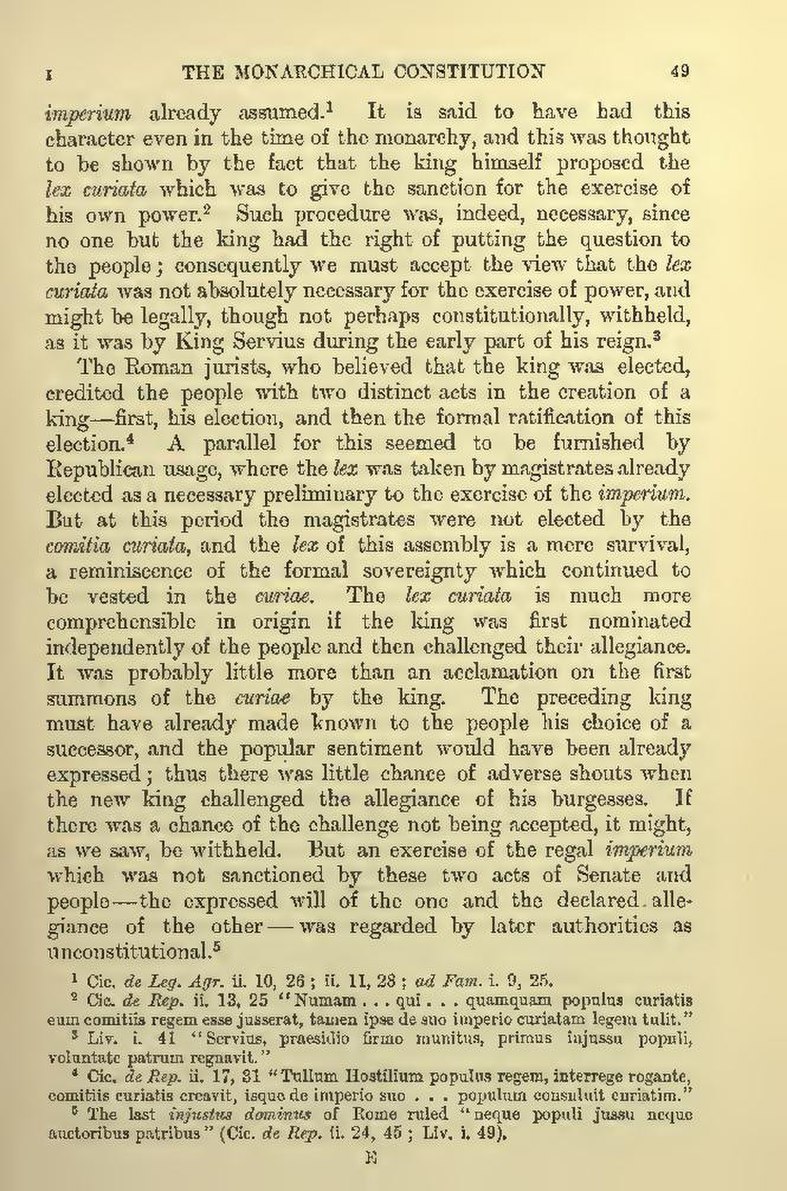imperium already assumed.[1] It is said to have had this character even in the time of the monarchy, and this was thought to be shown by the fact that the king himself proposed the lex curiata which was to give the sanction for the exercise of his own power.[2] Such procedure was, indeed, necessary, since no one but the king had the right of putting the question to the people; consequently we must accept the view that the lex curiata was not absolutely necessary for the exercise of power, and might be legally, though not perhaps constitutionally, withheld, as it was by King Servius during the early part of his reign.[3]
The Roman jurists, who believed that the king was elected, credited the people with two distinct acts in the creation of a king—first, his election, and then the formal ratification of this election.[4] A parallel for this seemed to be furnished by Republican usage, where the lex was taken by magistrates already elected as a necessary preliminary to the exercise of the imperium. But at this period the magistrates were not elected by the comitia curiata, and the lex of this assembly is a mere survival, a reminiscence of the formal sovereignty which continued to be vested in the curiae. The lex curiata is much more comprehensible in origin if the king was first nominated independently of the people and then challenged their allegiance. It was probably little more than an acclamation on the first summons of the curiae by the king. The preceding king must have already made known to the people his choice of a successor, and the popular sentiment would have been already expressed; thus there was little chance of adverse shouts when the new king challenged the allegiance of his burgesses. If there was a chance of the challenge not being accepted, it might, as we saw, be withheld. But an exercise of the regal imperium which was not sanctioned by these two acts of Senate and people—the expressed will of the one and the declared allegiance of the other—was regarded by later authorities as unconstitutional.[5]
- ↑ Cic. de Leg. Agr. ii. 10, 26; ii. 11, 28; ad Fam. i. 9, 25.
- ↑ Cic. de Rep. ii. 13, 25 "Numam . . . qui . . . quamquam populus curiatis eum comitiis regem esse jusserat, tamen ipse de suo imperio curiatam legem tulit."
- ↑ Liv. i. 41 "Servius, praesidio firmo munitus, primus injussu populi, voluntate patrum regnavit."
- ↑ Cic. de Rep. ii. 17, 31 "Tullum Hostilium populus regem, interrege rogante, comitiis curiatis creavit, isque de imperio suo . . . populum consuluit curiatim."
- ↑ The last injustus dominus of Rome ruled "neque populi jussu neque auctoribus patribus" (Cic. de Rep. ii. 24, 45; Liv. i. 49).
